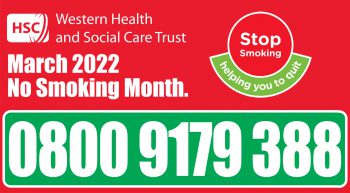25/02/2022

March sees the beginning of No Smoking Month. As part of this campaign, the Western Trust Smoking Cessation Nurse Specialist team would like to invite you to ‘Make March your month to quit’. This year the team stresses the importance of knowing the risks of smoking on the respiratory system.
Speaking on behalf of the team Michelle Scott said:
“Smoking is the biggest cause of preventable deaths in the UK. One in two smokers will die from a smoking-related disease. The evidence clearly shows COVID-19 virus attacks the respiratory system, smoking harms the immune system and smokers are therefore less protected and are at a greater risk. Officials have said smokers with coronavirus are 14 times more likely to develop severe symptoms, as the virus attacks the respiratory system, with both smoking and passive smoking weakening lungs. The best thing you can do for you and your loved ones is to use this opportunity to stop smoking now.”
Dr Catherine McDonnell, Western Trust Medical Director said:
“It is evident that the COVID-19 virus will be with us for a long time. There is a consistent association between smoking and the risk of COVID-19 related death. Therefore there has never been a more important time to stop smoking. Not only for your own health but to protect those around you. It will also help alleviate the huge pressures on the health and social care system.”
So what can you do? Seize the day and take action now
Contact your local G.P, pharmacy or call the Western Trust’s dedicated Smoking Cessation Helpline number 08009179388
Benefits of stopping include:
20 mins – Your blood pressure and pulse rate return to normal. Fibres in the bronchial tubes of your lungs that didn’t move so well due to exposure of smoke start to move which help irritant and bacteria out of the lungs helping reduce the risk of infection.
8 hours – Oxygen levels in your blood return to normal and the levels of nicotine and carbon monoxide are reduced by more than half. This increase in oxygen helps nourish tissues and blood vessels that were getting less oxygen while you were smoking.
24 hours – Carbon monoxide has been eliminated from your body. Your lungs start to clear out mucus and other smoking debris and you have already kicked started the risk reduction of a heart attack
48 hours – Your ability to taste and smell is improved. As nicotine levels deplete further, side effects of nicotine withdrawal such as anxiety and irritability MIGHT start to creep in BUT do not worry we have tips to help you with that. Along with hints and tips, Stop smoking medication can drastically help with this. Do not focus on quitting, embrace the quit smoking attempt by focusing on what you will be gaining.
3 days (72 hours) – Breathing becomes easier. Your bronchial tubes begin to relax and your energy levels increase. As nicotine is completely eliminated from your body withdrawal symptoms are at its peak BUT again using the advice and stop smoking medication will help. Look at the benefits you have already achieved and there’s more to come.
5 to 10 days – The average smoker will begin to notice a reduction in the number of cravings experienced in a day… you are getting there! Don’t be scared to use your stop smoking medication; using medication to stop smoking doubles your chance of success and makes cravings easier to manage
2 to 12 weeks – Circulation improves throughout the body making walking and running much easier due to the constant increase in circulation and oxygen levels in the body. You will be free of the addiction and any psychological effects of withdrawal should have ended
1 month – In just one short month you can already experience many health changes such as a sense of heightened overall energy and sinus congestion and shortness of breath have decreased. In addition to this, the fibres in your lungs that keep your lungs healthy start to grow back to reduce build-up excess mucus and bacteria that would have cause infection.
3 to 9 months – Lung function begins to improve markedly. Coughing and wheezing becomes less frequent and the risk of respiratory infections begins to decrease. For women, after 3 months quitting fertility can improve as well as reduce her risk that her baby will be born prematurely.
6 months – after 6 months quitting, many people often notice they are better able to handle stressful situations without feeling like they need to smoke.
1 year – lung capacity and function have dramatically improved and your risk of heart attack falls to approximately half that of a smoker
10 years – Your risk of lung cancer falls to about half that of a smoker. In addition to this, your risk of developing other smoking related illness also goes down. This includes a reduced risk of cancers of the: mouth, oesophagus, bladder, kidneys and pancreas.
15 years – Your risk of heart disease is nearly the same as someone who has never smoked
Other benefits worth celebrating quitting smoking include better smelling clothes, money saved and happier loved ones.
Make a list of why you should stop smoking including what benefits you want to gain and plan what you can spend the money on.
Due to COVID-19, specialist nurse drop in clinics remain suspended however telephone consultations have been setup along with prescription for Replacement Therapy such as NRT if required.
The Nurse Specialist Stop smoking helpline number 08009179388 is available




